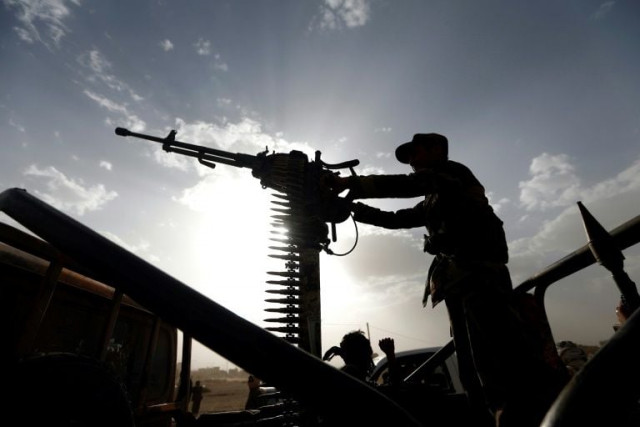Yemeni rebel missile shot down near Makkah
Missile was intercepted 69km south of the holy city, says Arab military coalition

A rebel stands on a vehicle mounted with a machine-gun. PHOTO: AFP
The missile was intercepted 69 kilometres south of the city in western Saudi Arabia, the coalition said in a statement, calling it "a desperate attempt by Shia Huthi rebels to disrupt Hajj", which begins at the end of August.
Yemen troops killed in suspected Qaeda attack: army
Occasional ballistic missile attacks, as well as more frequent short-range rocket fire over the southern border, have in the past been conducted after coalition air strikes against the rebels in Yemen and is not the first time rebels have fired in the direction of Makkah.
In October they launched one of their longest-range strikes against Saudi Arabia, firing a ballistic missile that was brought down near the holy city, an attack condemned by Riyadh's Gulf allies. But the new attack is thought to pose a threat ahead of Hajj, when some two million faithful from across the world will visit the site.
The Huthi rebels and their allies, former members of Yemen's security forces linked to ex-president Ali Abdullah Saleh, began retaliatory attacks against the kingdom two years ago.
The Saudi-lead coalition intervened in the country in March 2015 to support President Abedrabbo Mansour Hadi, who says the rebels are supported by its regional arch-rival Iran.
The war has killed more than 8,000 people and wounded 44,500 since Saudi Arabia and its allies joined the conflict. Nearly two million Yemeni children are "acutely malnourished" and a "vicious combination" of war, hunger and cholera have left the country in desperate need of aid, the United Nations warned this week.
The alarm was raised at the end of a two-day visit by the directors of the World Health Organization, the UN Children's Fund and the World Food Programme to Yemen, which has seen more than 8,000 people killed and 44,500 wounded since March 2015.
Drone kills two Qaeda suspects in Yemen
The Arab coalition said the new missile strike was proof of "continued arms trafficking [for the benefit of the rebels] at the port of Hodeida" on the Red sea. "The missiles continue to be smuggled in due to a lack of controls at the port of Hodeida," it said in the statement. It said permits given by the Arab coalition for the delivery of humanitarian aid and commercial cargo were being abused at the port.
The Arab coalition has consistently accused the Huthi rebels of trafficking weapons, a claim they deny.
Hodeida is the main entry point for crucial humanitarian assistance to the north of the country and to the capital Sanaa, which is under rebel control. The coalition wants to place the port under its control or that of the UN, which rejects the idea, fearing complications for the arrival of aid.
In the southern part of the country, which was taken over by the rebels in the summer of 2015, aid passes through the port of Aden.



















COMMENTS
Comments are moderated and generally will be posted if they are on-topic and not abusive.
For more information, please see our Comments FAQ